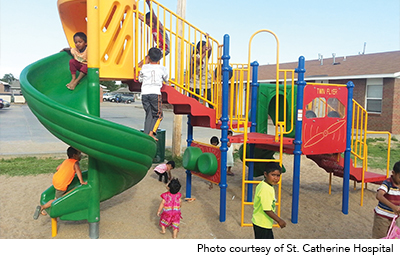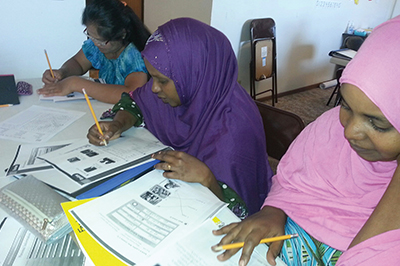By NANCY FRAZIER O'BRIEN

Children climb on playground equipment constructed at the Garden Spot apartment complex by the Finney County Community Health Coalition, sponsored by St. Catherine Hospital in Garden City, Kan.
What do school crosswalks, bus transportation for seniors, a park playground, reading classes and teen drinking have in common? They are all issues that affect a community's health, and they are among the many issues that St. Catherine Hospital in Garden City, Kan., is dealing with through the Finney County Community Health Coalition.
Founded in 2000 by St. Catherine Hospital and a small group of community leaders who wanted to reduce the county's teen pregnancy rate, then the third highest in the state, the coalition has grown to include more than 50 agencies that have received more than $3.4 million in grants to improve the community's health in a variety of ways.
The 132-bed regional hospital won the American Hospital Association's prestigious NOVA Award in 2014 for its collaborative efforts toward improving community health. The hospital is part of Centura Health, a joint venture of Catholic Health Initiatives and Adventist Health System.
"We take care of those who are ill and nurture the health of the communities we serve," said Edward Smink, St. Catherine's executive director of mission and ministry. "That's been an integral part of … St. Catherine since its inception." Smink calls the coalition "the eyes and ears of the community for the hospital."
Melting pot
Garden City has a population of about 35,000 but there are 20 languages spoken within its borders, Smink noted. The latest arrivals are Burmese and Somalian refugees, attracted to the area — as earlier immigrants were — by the availability of jobs at the local meatpacking plants.
When the coalition was first formed 14 years ago, a community needs assessment found three areas on which to focus — risky behavior by children and teens — including underage drinking, teen pregnancies and tobacco use — transportation issues; and training and education of children and families.
Lee Ann Shrader, executive director of the coalition, said the grant obtained to fight teen drinking had 16 separate strategies carried out in connection with the police department, schools, the public health department, the alcohol control board and many others.
"There were lots of publications, ads in the movie theater. The idea was change the culture in the town," Shrader said. "And you can see in the high school that there has been that turnaround."
Strong results
The coalition says underage drinking has been reduced 50 percent in Garden City, to 17 percent in 2013 from a baseline of 34 percent in 2007. Finney County is now ranked seventh in the state for teen pregnancies.
Among the coalition's other accomplishments:
- An anti-smoking campaign led the City Council to ban smoking in public buildings in 2007, two years before the Kansas Legislature took that step. The number of smokers in Garden City declined to 16.4 percent in 2012 from a 25.9 percent baseline in 2008.
- A "City Link" fixed-route bus service was created in 2008 to meet the needs of seniors and other residents to get to doctor appointments and buy groceries.
- Programs for parents and children have included after-school tutoring, parent training classes on "Guiding Good Choices," summer programs on life skills for youths and anti-drug programs.
- Providing helmets for children on bicycles and car seats for infants and children has reduced trauma to children to an "almost negligible" level, according to the coalition. Safety classes and police-led demonstrations of safe school routes also have helped in this area.

Refugees and immigrants study English as a second language at the Neighborhood Learning Center in Garden City, Kan.. The center was built by the Finney County Community Health Coalition, sponsored by St. Catherine Hospital.
Over the years, the coalition has received grants from CHI, state agencies, the federal Substance Abuse and Mental Health Services Administration and the federal grant project LAUNCH (Linking Actions for Unmet Needs in Children's Health), among others.
"We're known throughout Kansas," Smink said. When a funding organization wants to tackle a health problem, "they want the coalition involved," he said.
"The health department is constantly coming to us for different initiatives," Shrader added. "They recognize us as the leader in community health."
One of the coalition's latest focuses is the effects of domestic violence on children and families. A neighborhood learning center, built in one of the city's most violent areas and opened in July 2013, is part of this effort as is a coordinated response team of several county agencies. The neighborhood center provides resources to familiarize recent arrivals with services available from city and county agencies, including social services. It also provides classes in English, primarily for the Burmese and Somalian populations, and offers immunizations and other wellness programs.
The coalition built a playground at the nearby Garden Spot apartments and offers after-school and summer programs for children. Police officers offer monthly seminars on neighborhood safety and crime issues.
Other 2014 NOVA winners were First-Reach, an anti-diabetes program of FirstHealth of the Carolinas in Pinehurst, N.C.; the Asthma Action Team at Children's Hospital Center for Pediatric Medicine, Greenville Health System, Greenville, S.C.; Let's Go!: The Barbara Bush Children's Hospital at Maine Medical Center, Portland, Maine; and Hearts Beat Back: The Heart of New Ulm Project: New Ulm Medical Center, part of Allina Health, New Ulm, Minn.
Rich Umbdenstock, AHA president and chief executive, said in a news release that the 2014 NOVA awards honored hospitals that "know the power of collaboration and the positive community health changes that can be achieved when organizations work together."
Copyright © 2015 by the Catholic Health Association
of the United States
For reprint permission, contact Betty Crosby or call (314) 253-3477.